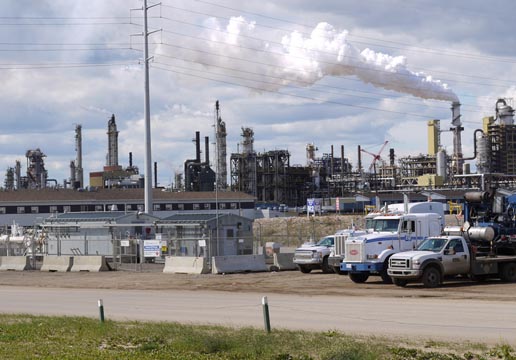There is a new report from Deloitte, Gaining Ground in the Oil Sands 2013, asking Canadians to rally round the ‘oil sands’ as Canada’s all-important economic engine for the next several decades.
In the same week as this report came out three major reports: PwC’s Too Late for Two Degrees?, the World Bank’s Turn Down the Heat, UNEP’s Emissions Gap 2012 and an open letter addressed to governments from large institutional investors each focused upon the emerging global carbon budget science to show that increasing emissions will lead to a four to six degrees Celsius temperature increases before the end of the century.
Each blamed government inaction and continuing investment in fossil fuels; each warned of dire consequences for future generations if we don’t change tack. (The carbon budget science is actually far more sinister than these conservative institutions will acknowledge — see here for a clearer picture of our climate plight.)
Canada has signed on to the so-called Copenhagen Accord, an Accord which includes a commitment to cap global temperature rise to a maximum of two degrees in order to stay safe from dangerous climate change.
Scientists (Meinshausen, Allen, and Anderson-Bows, for starters) have worked out a global carbon budget to stay below two degrees. As Bill McKibben has pointed out, this control of emissions must entail keeping 80 per cent of the present known coal, oil and gas reserves in the ground until they can be used without emissions. Coal and higher emission cost bitumen must be mothballed immediately. Even then we have only something like a 70 per cent chance of staying below two degrees, and two degrees is now known to be deep into dangerous climate change.
We benefit greatly from both the production and use of fossil fuels but the consequences fall on future generations (given accumulating greenhouse gases and carbon cycle time lags which average about 40 years). The consequences are predicted to be catastrophic.
Our economy and its steady growth are important to Canadians but it cannot be at the cost of our kids and grandkids. It is criminal to benefit today from actions that will cause so much pain, that threaten everything we know and love: civilization or nature as we know it today, or even the opportunity for our kids to have a life, a future.
How can Canada’s government and the business community be so myopic as to continue to plan and advocate for the expansion of fossil fuel production as economic saviour against the scientific evidence (and against alternative economic planning — see More Bang For Our Buck: “Canada’s increasing reliance on the oil sands is not the best strategy for the economy or our environment”).
No matter how important the oil sands are as a potential economic engine over the coming decades, it would be criminal to disregard the existing science and try and build new infrastructure (like pipelines) to ramp up production. The chief economist for the International Energy Agency (IEA), Fatih Birol, with the release of the IEA 2011 report, warned that building new infrastructure would lock us in to emissions we can’t afford:
“The door is closing, ” said Birol. “I am very worried — if we don’t change direction now on how we use energy, we will end up beyond what scientists tell us is the minimum [for safety]. The door will be closed forever.”
The authors of the Deloitte oil sands report seem to consider ducks drowning in tailing ponds or chemical pollution or pipeline spills as the oil sands environmental problems that can be solved if we all accept that the oil sands as economic engine is so important for the Canadian economy. But the fundamental problem is GHG emissions from all but the cleanest fossil fuels (natural gas for the transition).
It is folly to not consider this fundamental problem. But Canada’s mainstream media, including the CBC, seem cowardly reluctant to inform Canadians about what should be the most important debate about our common future.
Even Elizabeth May, Kirsty Duncun and Megan Leslie have stayed (politically safe) away from properly informing Canadians. Has anyone asked Justin Trudeau if he supports mothballing the tarsands to catalyze leadership in trying to stay under 2 degrees Celsius at this crucial time for humanity?
Climate change isn’t going away — in fact, it seems to be getting worse faster than predicted.
Smart businessmen and Canadian leaders with foresight should recognize that investment in the oil sands now is not only not a prudent investment but criminal.
Bill Henderson is an activist who lives in Gibsons, B.C.
Photo: Velcrow Ripper



